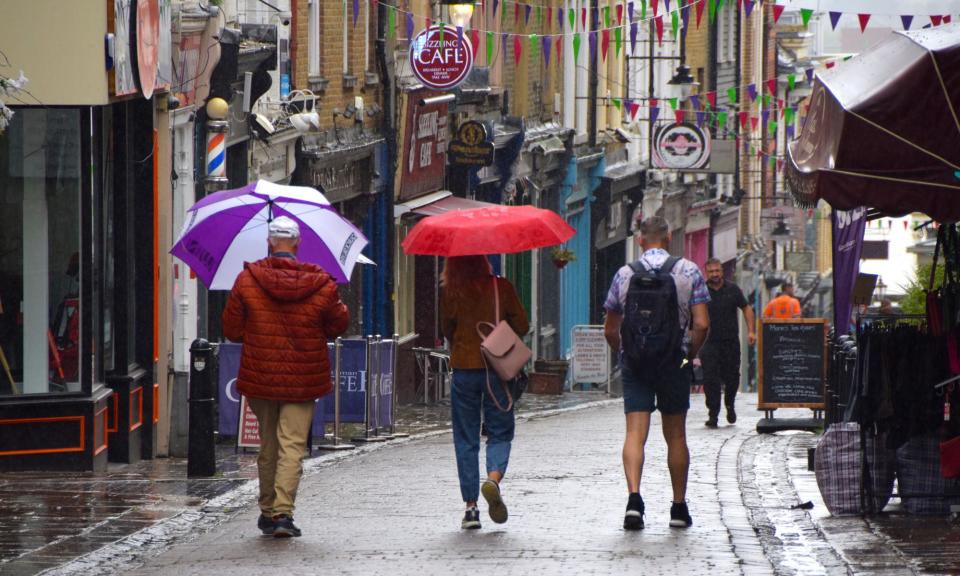Wet weather woes cause damp start to spring for retailers and restaurants

Cold wet weather and caution about spending amid high interest rates and energy bills have delivered a dismal start to spring for retailers and restaurants, the latest industry figures show.
Sales were virtually flat across March and April against the same period a year ago, according to the latest figures from the British Retail Consortium (BRC) trade body and advisory firm KPMG. That was despite prices continuing to rise with inflation, suggesting a drop in the volume of items sold in the key Easter period.
In the four weeks to the end of April, sales were down 4%, but this number was partly affected by Easter falling early this year at the end of March. Non-food sales were the hardest hit, down almost 3% with in-store and online orders down.
Helen Dickinson, the chief executive of the BRC, said shoppers had delayed spring purchases despite retailers’ efforts to tempt them with heavy discounts: “Dismal weather and disappointing sales led to a depressing start to spring for retailers, even accounting for the change in timing of Easter.”
She said a dull, wet April dampened sales growth for clothing and footwear, especially outdoor sportswear, as well as DIY items and garden furniture. Discounts on computers did boost sales as many sought to upgrade devices they had bought a few years ago during the pandemic surge in home technology sales for working and studying from home.
The number of shoppers visiting high streets and other retail destinations slumped more than 7% in April, far worse than the 1.3% fall recorded in March, because of poor weather and the shift in the timing of Easter, according to separate data out last week from the BRC and monitoring firm Sensormatic Solutions.
“Many retailers are hoping for brighter sales over the summer months as social events ramp up, and consumer confidence could improve with a potential cut in interest rates,” Dickinson said.
The difficulties for retailers come as Britons remain cautious about spending on “big ticket” outlays including DIY projects and furniture, but are splashing out on trips to the cinema and pubs to watch the latest Dune film, the Six Nations rugby and football’s FA Cup fixtures, according to the latest Barclays consumer spend report released on Tuesday.
It also found travel was being prioritised, with airline spending up nearly 10%. By contrast, clothing sales were down 1.8%, according to the lender, as spring showers deterred shoppers from visiting the high street, while restaurants had another challenging month, down 12.6%, a similar fall to that in February.
Mark Arnold, head of savings & mortgages at Barclays UK, said: “Non-essential spending is still reeling from last year’s spike in housing costs, which caused both homeowners and renters to cut back while looking for additional sources of income – such as delaying renovations and renting out spare rooms.”
The figures emerged as 45% of consumers told Barclays they were continuing to rein in discretionary spending, with more than half of that group cutting back on clothing and accessory purchases, and nearly half spending less on dining out.
One in six (16%) were not confident about their ability to meet mortgage or rental payments, as spending on those essentials rose 1.6%, a much lower pace of increase than through last year, but still up on high levels.
Karen Johnson, head of retail at Barclays, said retailers had already been braced for a subdued start to the year but were hopeful things would pick up: “In spite of this initial lull, many retailers are confident that spending will rebound in the coming months, particularly in anticipation of better weather, the energy price cap drop, an uplift in the national minimum wage, and the buzz around big events such as Taylor Swift’s Eras tour and the Paris 2024 Olympics.”

 Yahoo Finance
Yahoo Finance 